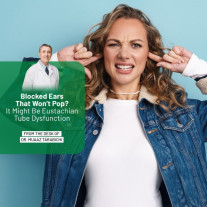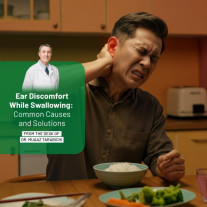Know What Triggers Your Snoring
Contact Us
Snoring may seem harmless, but it can be more than just a night time nuisance. While some snore occasionally, for others it becomes a chronic issue that affects both their sleep and their relationships.
But what really causes snoring and when is it a sign of something more serious?
What is Snoring?
Snoring happens when air doesn’t flow smoothly through your nose or mouth while you sleep. This can cause the soft tissues in your airway to vibrate, producing the familiar grumbling or rattling sound.
Some people breathe heavily or make soft snorting sounds, while others snore loudly and continuously. In many cases, it’s harmless. But in others, snoring can signal a more serious condition, such as obstructive sleep apnea where breathing pauses for a few seconds while you sleep.
Why Do People Snore?
Snoring can be caused by a variety of physical, lifestyle, or environmental factors. Understanding what’s behind your snoring is the first step toward a better night’s sleep for you and the people around you.
Here are some of the most common causes:
1. Age
As you grow older, your airway becomes narrower and throat muscles become weaker, making it easier for tissues to vibrate while breathing.
2. Weight and Fitness Level
Carrying excess weight—especially around the neck or throat—can narrow your airway and increase your risk of snoring. Even people who are not generally overweight may snore if they have poor muscle tone.
3. Natural Anatomy
Men are more likely to snore due to having narrower air passages. Other inherited traits—like a narrow throat, large tonsils, or a cleft palate—can also play a role.
4. Nasal and Sinus Problems
A blocked nose or nasal congestion (from colds, allergies, or sinus infections) can make breathing difficult, forcing you to breathe through your mouth and causing snoring.
5. Alcohol and Sedatives
Drinking alcohol or taking sedative medications before bed can overly relax the muscles in your throat, increasing the chances of snoring.
6. Sleep Position
Sleeping flat on your back allows gravity to pull the soft tissues of your throat backward, partially blocking your airway.
Other Contributing Factors
Several factors can contribute to snoring, including the later stages of pregnancy, enlarged tonsils or adenoids, the use of sleeping pills or tranquilizers, having a large tongue or a small mouth, allergic reactions that cause nasal blockage, and swelling of tissues such as the uvula or soft palate.
Symptoms to Watch For
Most people notice snoring because of the sound. But when snoring becomes frequent or loud, it may point to an underlying issue.
You may also experience:
- Morning headaches
- Feeling tired even after a full night’s sleep
- Trouble concentrating or memory issues
- Waking up suddenly during the night
- Breathing pauses while sleeping (noticed by a partner)
These are often signs of sleep apnea, a condition that can seriously affect your health if left untreated.
Can Snoring Lead to Complications?
Occasional snoring may not be serious, but chronic or untreated snoring can lead to poor sleep quality, daytime fatigue, relationship difficulties, and even sleep apnea—a condition where breathing repeatedly stops and starts during sleep. If sleep apnea is left untreated, it can increase the risk of high blood pressure, heart disease, and other serious health conditions.
How is Snoring Treated?
Treatment depends on how frequent and severe the snoring is and whether sleep apnea is involved.
Here are some common options:
Lifestyle Changes
Simple adjustments can often help reduce or even eliminate snoring. Maintaining a healthy weight, avoiding alcohol and sedatives before bedtime, changing sleep positions such as sleeping on your side treating nasal congestion, and elevating the head of your bed are all effective strategies to minimize snoring.
Oral Devices
Mouthpieces or oral appliances help keep the airway open and prevent tissue vibration.
Mouth and Throat Exercises
These can strengthen airway muscles and reduce snoring over time.
Continuous Positive Airway Pressure (CPAP) Machines
For sleep apnea, Continuous Positive Airway Pressure (CPAP) devices are often prescribed to keep the airway open.
Surgical Solutions
In some cases, surgery may be recommended to remove or reduce obstructions like large tonsils or deviated septum.
Expert ENT Care in Dubai for Snoring and Sleep Issues
At Tarabichi Healthcare, we offer advanced and compassionate ENT care in the heart of Dubai. If snoring is disrupting your sleep or affecting your well-being, our expert team is here to help. We specialize in minimally invasive techniques particularly endoscopic ear and sinus procedures that offer faster recovery and long-term relief. Experience quiet nights and better breathing with personalized care designed for comfort, precision, and lasting results.
CONSULT THE BEST ENT DOCTOR IN DUBAI
If you or a loved one is struggling with persistent ear ache, it could be more than just discomfort early evaluation and treatment may offer lasting relief.
Our team of the Best ENT doctors in Dubai, at Tarabichi Healthcare is committed to delivering world-class care with precision and compassion.
Meet our dedicated specialists: Dr. Muaaz Tarabichi, Dr. Michael Timms, Dr. Mustafa Kapadia, Dr. Satish Jain, Dr. Baher Ashour, Dr. Shailesh Khode and Dr. Jamal Kassouma.
We provide Gentle, precise, and patient-focused interventions to your condition, with a strong focus on safety, accuracy, and long-term results.
For Consultations and Appointments, reach out to us at




